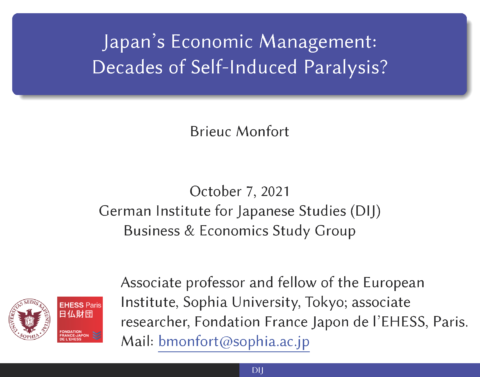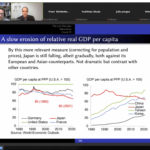
Download
Registration Info
This is a past event. Registration is no longer possible.
Please subscribe to our DIJ Newsletter to stay informed about our research activities, events, and publications:
Japan’s economic management: decades of self-induced paralysis?
October 7, 2021
Brieuc Monfort, Sophia University
Back in the 1970s, Japanese policymakers earned the reputation of being the most competent among their peers within advanced economies for successfully weathering the second oil shock. Where has this reputation gone? The high growth of the late 1980s proved to be transient, as a succession of financial crises led to the “lost decade” of the 1990s. Ben Bernanke (1999) famously described the initial measures to fight deflation that would dominate the 2000s as “a self-induced paralysis”. A more forceful set of policies called “Abenomics” in the 2010s also ultimately fails to achieve its ambitious goals of 2% GDP growth and 2% inflation, a shortcoming blamed on either error in design or pusillanimity in implementation. Empty stadiums during the Tokyo Olympics because of the Covid-19 pandemic were seen as yet another proof of poor management.
Brieuc Monfort’s presentation focused on three cases (the lost decade, Abenomics, Covid-19) to discuss to what extent the narrative of a never-ending crisis reflects hindsight bias, theoretical assumptions, and narrowly defined comparisons. Following his presentation, the participants discussed wide-ranging subjects such as fiscal policy, the policies of the new Prime Minister Kishida, demographics and labor market, monetary policy as well as issues related to equality and environmental policies.
Brieuc Monfort (PhD in economics) is associate professor in the Department of French Studies at Sophia University in Tokyo and associate researcher at the Fondation France-Japon de l’EHESS in Paris. He is also a fellow at the European Institute at Sophia University. He previously worked for the International Monetary Fund in Washington D.C. and for the French Ministry of Finance in Paris and in Tokyo. He co-authored a book with Sébastien Lechevalier, Lessons from the Japanese Experience: Towards a New Economic Policy (Editions ENS Rue d’Ulm, 2016).

